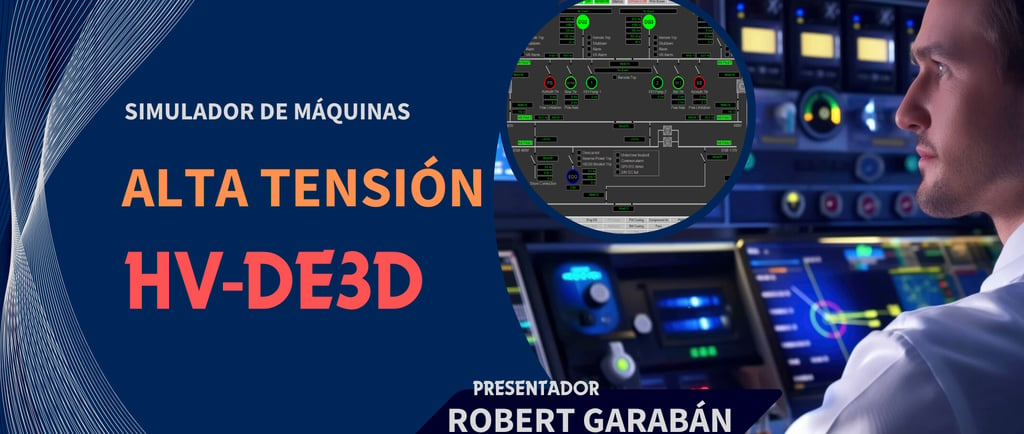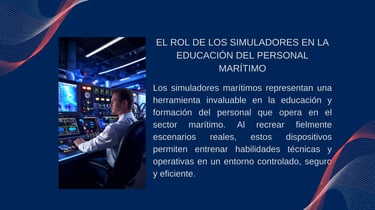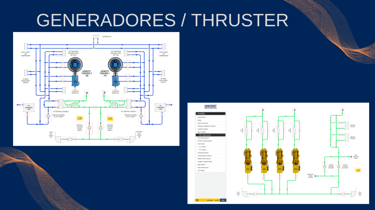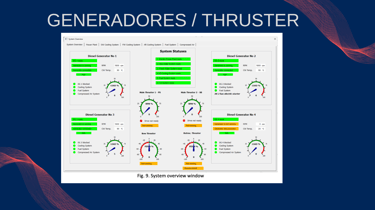Maritime Simulators are revolutionizing High-Tech Training for the Merchant Navy
Maritime simulators are advanced tools that have transformed the training of professionals in the maritime sector. They represent a high-tech solution designed to recreate real scenarios of operation on board ships, allowing users to develop technical and operational skills in a controlled and secure environment. Among the outstanding systems, the UNITEST HV-DE3D simulator focuses on diesel-electric propulsion, integrating main generators, azimuthal thrusters, retractables and bow propellers, offering a practical approach to train future operators. This system allows you to become familiar with key aspects such as start-up procedures, the operation of cooling systems, lubrication, and energy control in real conditions.
Robert Garabán Garcías
11/30/2024








Maritime simulators as the axis of the evolution in the formation of the maritime sector
Training in the merchant navy has entered a new era thanks to the adoption of the latest technology maritime simulators. These innovative tools not only accurately reproduce the systems and scenarios found on ships, but also provide a secure platform for technical and operational learning. The incorporation of simulators is not a simple advance in teaching, but a transformative change that redefines the preparation and performance of maritime personnel in a highly demanding environment.
Operational realism as the basis of effective learning
A modern simulator, like the UNITEST HV-DE3D, offers a virtual environment with an unprecedented level of realism. This system reproduces the operation of azimuthal thrusters, bow propellers and diesel-electric generators with technical precision, allowing users to train in complex maneuvers, energy control and fault management. Students can experience how the ship's systems interact in real time, facing scenarios identical to those they will find on the high seas, but in a completely safe and controlled environment. This immersive experience ensures that shipping operators are fully prepared to face any technical or operational challenge.
Safety and efficiency as pillars of training with simulators
The implementation of simulators eliminates the risks associated with training on ships in operation, thus minimizing the chances of accidents and material losses. In addition, these tools allow you to test emergency situations, such as propulsion failures, fires in the engine room or extreme weather conditions. By allowing students to train repeatedly without incurring additional costs or stopping the operations of a ship, the simulators optimize both learning and operational logistics.
The value of personalization and adaptability in maritime education
One of the great benefits of simulators is their ability to adapt to the specific requirements of different vessels and operational scenarios. Whether for cargo ships, cruise ships or offshore platforms, these tools are configured to provide training adjusted to the particular needs of each type of operation. In addition, the simulators allow the incorporation of advanced control systems, such as Dynamic Positioning (DP), ensuring that personnel are trained in the most modern and demanded technologies in the sector.
The positive impact on sustainability and resource management
Beyond their technical usefulness, simulators contribute significantly to operational sustainability in the maritime industry. They reduce the consumption of fuels and materials that would otherwise be used during training on real ships. This not only reduces the environmental impact, but also reinforces compliance with international regulations that regulate emissions and the responsible use of resources in maritime transport.
A future perspective for the professionalization of the merchant navy
Simulators not only represent a learning tool, but also a vision of the future of maritime training. As technologies continue to evolve, these platforms will integrate even more advanced systems, such as artificial intelligence and predictive analysis, allowing more accurate simulation of complex situations. This positions simulators as the gold standard in teaching, ensuring that merchant marine crews are prepared to operate in a modern, technologically advanced and sustainable maritime environment.
A conclusion that invites continuous development
The use of maritime simulators is not a passing trend, but a strategic necessity to face the challenges of the maritime industry. They guarantee effective learning, promote operational safety and contribute to the sustainability of the sector. In a world where technology advances by leaps and bounds, these tools will continue to be essential to train leaders and crews who will keep global navigation on its course towards a more efficient, safe and environmentally friendly future.


